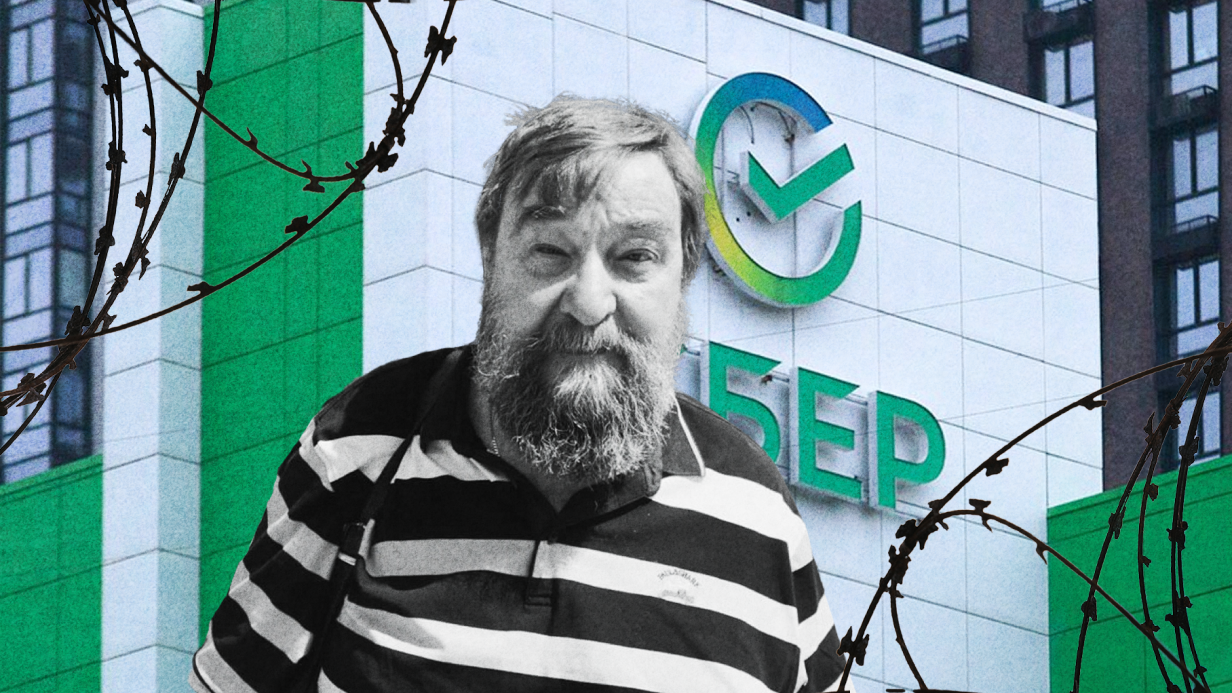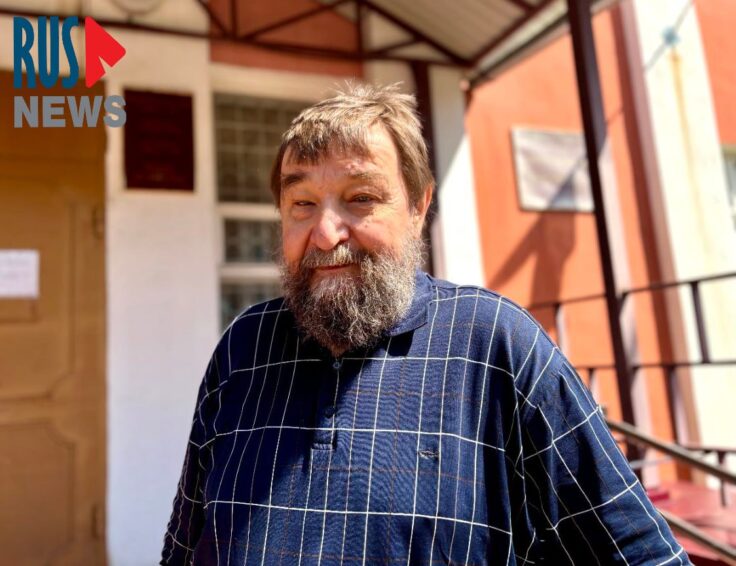
On July 11, the Pereslavl District Court announced the verdict for Sergei Abramov, a corresponding member of the Russian Academy of Sciences (RAS). The court found the scientist guilty of funding extremist activities (Part 1, Article 282.3 of the Russian Criminal Code) and imposed a fine of 150,000 rubles (approximately $1,500). The charges stemmed from seven donations totaling 7,000 rubles (~$70) to the FBK (the transliterated Russian acronym for Fond Borby s Korruptsiyey — the Anti-Corruption Foundation founded by Alexey Navalny). While the legal ordeal has concluded, Abramov’s return to an active professional life remains a distant prospect. In an interview with T-invariant prior to the verdict, Sergei Abramov described how his presence on the “extremists and terrorists” list has led to what he calls, if not a “civil death,” then severe civil disability.
Breaking news about scientists’ lives during wartime, videos, and infographics—subscribe to the T-invariant Telegram channel to stay updated.
Pretrial Detention, House Arrest, Psychiatric Evaluation
The timeline of Abramov’s persecution is as follows. According to the prosecution, Abramov made donations between August 2021 and February 2022. On April 10, 2023, authorities searched Abramov’s home and those of his relatives, and then he spent a day and a half in a pretrial detention center. On April 12, 2023, he was formally charged with financing extremism by a court in Yaroslavl. The court ordered house arrest, banning all correspondence and external communication. The case gained public attention through media reports a month later, on May 11, 2023. On October 10, 2023, Abramov was released from house arrest and subjected to a travel ban. On November 30, 2023, the court approved the Federal Security Service (FSB) motion to subject Abramov to inpatient psychiatric evaluation. He was admitted to the Yaroslavl Psychiatric Hospital and released in late December 2023.

On January 30, 2024, Abramov was summoned for questioning and informed that the psychiatric evaluation had deemed him mentally competent. Abramov gave a detailed interview to T-invariant and published his diary entries chronicling his two weeks in the psychiatric facility. Court hearings began in early May 2024, and T-invariant reported that the prosecution failed to establish who made the payments or their intended recipients. The linguistic analysis of Abramov’s Facebook posts, conducted by a recent undergraduate from a law school, was deemed baseless. The defense maintained his innocence, arguing that the FSB had misused the Merchant ID as the key evidence in FBK donation cases. In reality, the Merchant ID is merely a payment processing identifier (the payment service Stripe uses a single merchant account and ID for payments to all clients — see T-invariant’s detailed analysis). The American Physical Society issued an exceptionally rare public statement in support of Abramov, and so did several Russian scientists. At the 2023 National Supercomputing Forum in Russia, all participants signed a joint appeal addressed to multiple government agencies, from the Investigative Directorate of the FSB to the Presidential Administration of Russia.
About Sergei Abramov
Sergei Abramov was born in 1957 in Moscow. In 1980, he graduated from Moscow State University. Since 1986, he has worked at the A.K. Ailamazyan Program Systems Institute of the RAS, serving as its director from 2003 to 2022. For many years, Abramov also served as rector of the University of Pereslavl, established under the institute. He specializes in systems programming and information technology, including supercomputing, telecommunications, and the theory of constructive metasystems and metacomputations. He holds a doctorate in physics and mathematics and has been a corresponding member of the RAS since 2006. Previously, he led Russia’s SKIF and SKIF-GRID programs for supercomputer development (a joint project with Belarus). According to Abramov, about 15 years ago, the FSB conducted preliminary investigations into possible treason charges against him (read more in his detailed interview with T-invariant), but ultimately dropped the allegations.
No Bank Accounts, No Teaching, No Travel Abroad
Compared to the numerous criminal cases involving donations to the foundation established by Alexei Navalny, the Pereslavl court’s ruling is notably lenient. However, this relatively mild verdict does little to restore the professional or personal life of the leading supercomputing expert. Abramov will remain burdened by an unspent conviction under a serious criminal charge and, more enduringly, by his presence on the Rosfinmonitoring (Russia’s financial monitoring agency) registry of “extremists and terrorists” since June 26, 2023. This status imposes severe restrictions on his rights for an indefinite period, potentially one to eight years after the verdict takes effect.
First, his personal and business accounts, including those of his high-tech companies, remain frozen. He is barred from any transactions involving his property. Second, he is prohibited from any teaching activities. Abramov, while also leading the A.K. Ailamazyan Institute for nearly two decades, served as rector of the University of Pereslavl and as a professor there. And even any non-teaching work in the educational sphere is also prohibited for him. Third, Abramov is effectively banned from leaving Russia or obtaining a passport. The Ministry of Internal Affairs will subject him to ongoing “administrative supervision,” including regular visits from local police and monitoring of his social media activity.
Legal experts note that individuals on the Rosfinmonitoring registry face long-term challenges, including difficulties finding employment even in the private sector, renting housing, purchasing vehicles, or obtaining insurance. These are the most significant restrictions for the 68-year-old, seriously ill scientist, but many more exist. Abramov may petition for expungement of his conviction and removal from the registry only once per year.
“Sber-Extremist” and “Sber-Terrorist” Banking Plans
“For over two years, I’ve been stuck on the Rosfinmonitoring registry of ‘extremists and terrorists.’ It’s not just that my rights are stripped away — I endure constant humiliation. What’s my daily life like? All my accounts and assets are frozen: Sberbank [the largest state bank. — T-invariant], Tinkoff Investments, BCS Investments, even the funds in my Ozon account [online marketplace. — T-invariant.]. I can’t access any money, including the accrued state pension payments I received from March 2017 until June 26, 2023. Sberbank only released 22% of my pension, claiming I spent the rest without providing any evidence. And how do I even get that money? I must travel 25 kilometers to the nearest Sberbank branch, fill out a request form for my monthly pension or salary from my frozen accounts, and wait a day or two for a call saying it’s approved. Then I go back, take a ticket, meet with a teller, who starts the process and says, ‘Your request to unlock the funds has been sent; sit down, and I’ll call you when it’s done.’ Typically, I wait 1 to 2 hours, but on several occasions, I’ve waited 3 to 4 hours only to be told that the funds couldn’t be released and to come back another day.” Sergei Abramov shares in an interview with T-invariant.
Abramov tried to sue Sberbank. “I wanted to access all my accrued state pension payments — not just 22% — received before my presence on the Rosfinmonitoring registry, but I lost the case. Clearly, this was a consumer rights issue [Under Russia’s consumer protection law, such banking disputes must be heard in the plaintiff’s region. — T-invariant], but at Sberbank’s request, all such cases are moved to Moscow’s Gagarinsky District Court. It’s more convenient for Sberbank; they prefer to litigate at their registered location, so people from the regions have to travel to Moscow. Thousands on the registry are fighting to reclaim their pensions or stipends from Sberbank. And guess what? The bank wins nearly every case in that court. That’s the judicial practice!” the scientist told T-invariant.
“A trip to the Gagarinsky Court means over an hour by car, more than an hour and a half by train, then the subway, and waiting at various points. On average, it’s four hours each way. For the first hearing, I woke up at 3:00 AM, my wife drove me to the train at 4:30 AM, and I arrived at the court by 9:15 AM, only for Sberbank’s representative to not show up, submitting a motion for more time to prepare their position. By 9:30 AM, I was heading home. I’ve proposed to Sberbank that clients like me be granted limited Sberbank Online access to submit pension or salary withdrawal requests, communicate with the bank, and view account details, while keeping account operations blocked. I also suggested issuing a restricted-functionality bank card — call it the ‘Sber-Extremist’ or ‘Sber-Extreme’ plan, and for those marked with an asterisk on the registry, the ‘Sber-Terrorist’ or ‘Sber-Terror’ plan. With such a card, funds could only be spent, not deposited, and replenished only through the current in-person process but via a mobile app. My proposals have been ignored. My loss of rights persists. If this isn’t civil death, it’s a form of severe civil disability,” Abramov explained.
“Any Verdict Without Imprisonment Is a Victory Today”
The Rosfinmonitoring registry includes about 18,000 individuals, according to RIA News on July 6, 2025. “It’s sobering to consider how these people live, why they’re added to the list before any trial, and how difficult it is to be removed. What about the presumption of innocence? What does the Constitutional Court think about this? How do those who devised and approved Federal Law No. 115 (on countering money laundering and terrorist financing) sleep at night?” Abramov mused.
Evgeny Smirnov, an attorney with the human rights project First Department, notes that the basis for removal from the Rosfinmonitoring registry is the expungement of a conviction, which can be requested one year after paying the fine. Subsequently, he can request removal from the Rosfinmonitoring registry and await its decision. Smirnov views the verdict in the context of current times: “Today, any verdict that avoids imprisonment is a victory.”
Abramov may be the highest-profile figure in the “FBK extremist case,” but he is far from the only one; the number of accused “extremist donors” continues to grow. Many are ordinary citizens: some wrote messages in the snow, while others donated as little as 200 rubles (~$2). Notable cases include Alexei Malyarevsky, a programmer from Dolgoprudny, who received seven years for a $150 donation (twice the amount in Abramov’s case). An even more egregious case involved Ivan Tishchenko, one of Moscow’s most prominent vascular surgeons, sentenced in December 2024 to four years in prison for a $70 FBK donation. Abramov, indeed, was fortunate again. “If you ask me about the prognosis for my case, I’ll repeat what I’ve said for two years: Russia is a country of unpredictable outcomes. Anything is possible!” he stated repeatedly during court hearings and in media comments. Yet the verdict shows that it remains impossible for a prominent scientist to return to supercomputing research, and impossible for authorities to stop targeting even those loyal to the regime. This is evident not only in Abramov’s case but also in that of Vsevolod Opanasenko, another leading supercomputer developer, whose case spanned over five years. Experts estimate that Russia has fallen decades behind in this technological sector, losing significant ground in global supercomputing rankings.